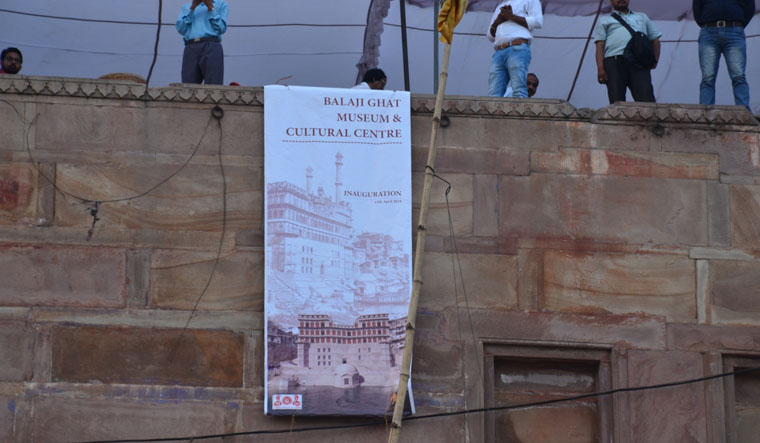It's a city considered sacred by Hindus and is among the oldest in the world to have been continually inhabited. As the Ganges river flows past its ghats, all 88 of them, each one has a historical tale to tell—if only the walls could speak.
One such is the Balaji Ghat, which is more popularly known as the abode of legendary shehnai artist Ustad Bismillah Khan for his early morning "riyaaz". It is said that the late musician would start his day from the 'naubatkhana' of the Balaji Ghat Palace and enthral listeners.
Built in 1735 by Maratha king Balaji Peshwa, it is an integral part of the riverfront and forms a part of the larger Panchganga Ghat. But the place turned into a pile of debris when four floors of the building completely collapsed in 1999. And again in September 2009, the floor of the naubatkhana also collapsed.
Realising the survival crisis that this culturally-rich structure was facing, INTACH carried out an initial documentation of the building in 2009. And, in 2012, INTACH nominated it for World Monuments Watch (WMW) and decided to take the initiative for renovating it—after the Archaeological Survey of India (ASI) granted it permission to do so.
After seven years of hard work and much effort, the building has been restored to its past glory and has also been thrown open to the public. A bonus to this heritage building is the museum which has placed all the antique pieces for display.
"We realised the need for immediate work and started off. Since it was a very vital project we involved only INTACH members for the restoration work," Bindu Manchanda of INTACH told IANS.
And for the smooth functioning of the restoration project, American Express extended its helping hand towards INTACH and contributed Rs 1.5 crore for the entire work.
"It is a partnership between INTACH and American Express. The hardwork has paid off and we are very happy with the outcome. It was great to be able to contribute" in the protection of a heritage monument, Manoj Adlakha, SVP and CEO, American Express Banking Corp., India, told IANS.
For the past two decades, American Express has partnered with a number of leading preservation organisations, including World Monuments Fund, to preserve and build awareness for at-risk heritage sites, and engage the public in preservation efforts around the world. Till date, American Express has granted more than $60 million in support for hundreds of preservation projects globally.
"Varanasi is a spiritual place; it is deeply rooted in culture and heritage. We have been doing a lot of work related to our CSR initiatives and we will continue doing so from time to time," Adlakha added.
According to INTACH, some prime reasons for the poor condition of the building were natural calamities, earthquakes, floods, lack of regular maintenance and decay of timber due to exposure to excessive moisture.
But when INTACH started off, there were many obstacles it needed to overcome, some major ones being encroachment, dumped waste in and around the building, inappropriate wiring, stagnant water near the building and clogged drains, to name just a few.
"Another problem that we faced was clearing the debris. We had to be very careful while doing so because many of the portions were in stable condition and we had to save and keep them intact. This was a challenge," Manchanda explained.
The restoration was not easy. There was a need to be sensitive and carry it out in a manner that the integrity and authenticity of the palace were not damaged.
"The choice of building materials needed to complement this historic palace. Achieving structural stability was another important component of the activity," Manchanda said.
However, she lamented that some of the front portions of the building couldn't be completed as the Varanasi Development Authority (VDA) didn't grant permission to do so.
"It is unfortunate that some parts have been left out; this doesn't complement the restored part. VDA should give us the permission to complete the work, because it is a piece of history. Also, we are looking for more financial cooperation from other MNCs," she added.
-IANS


